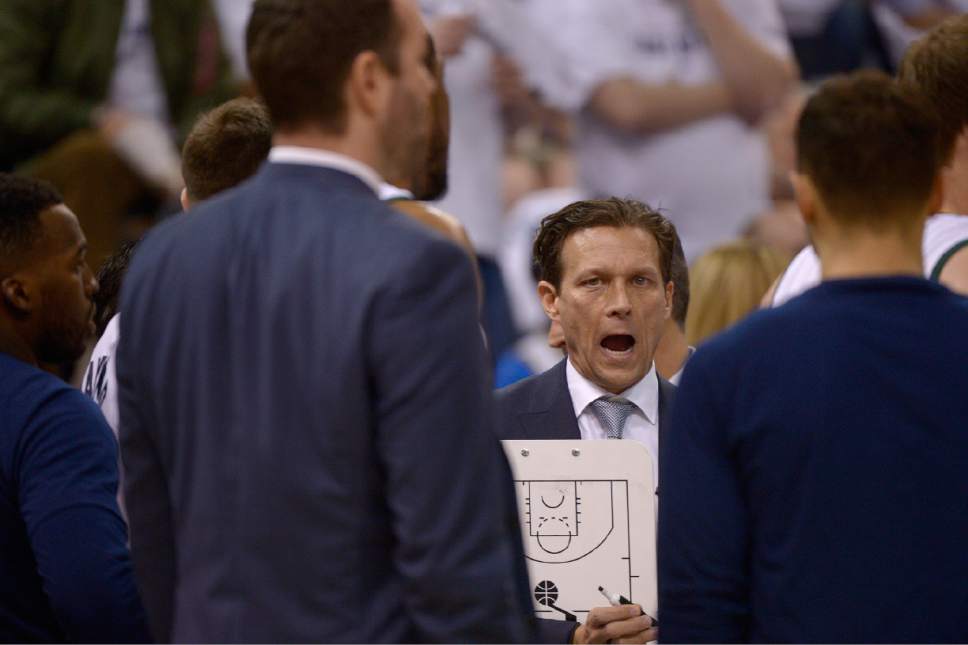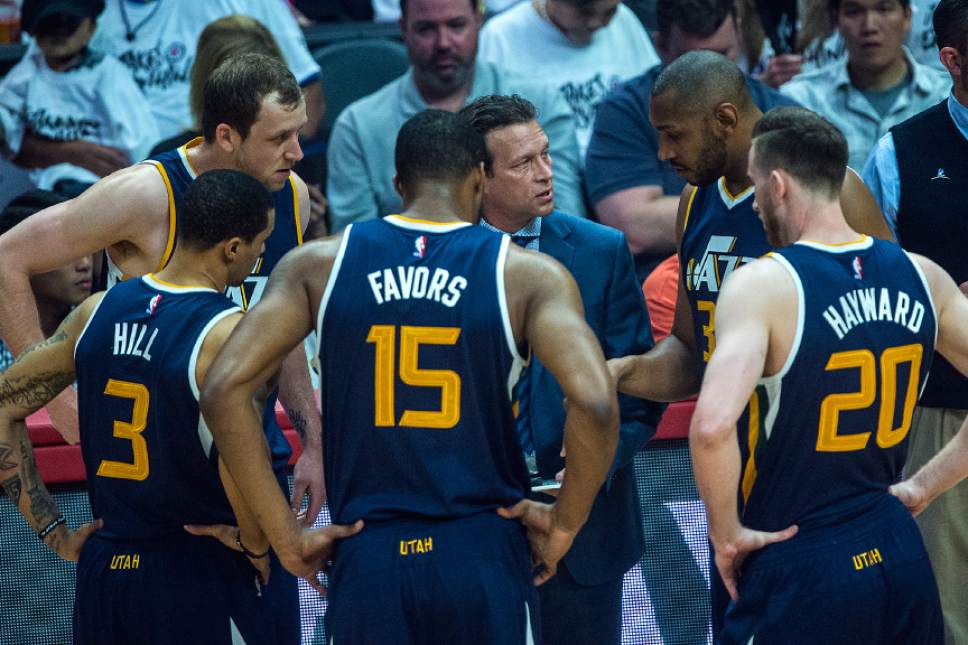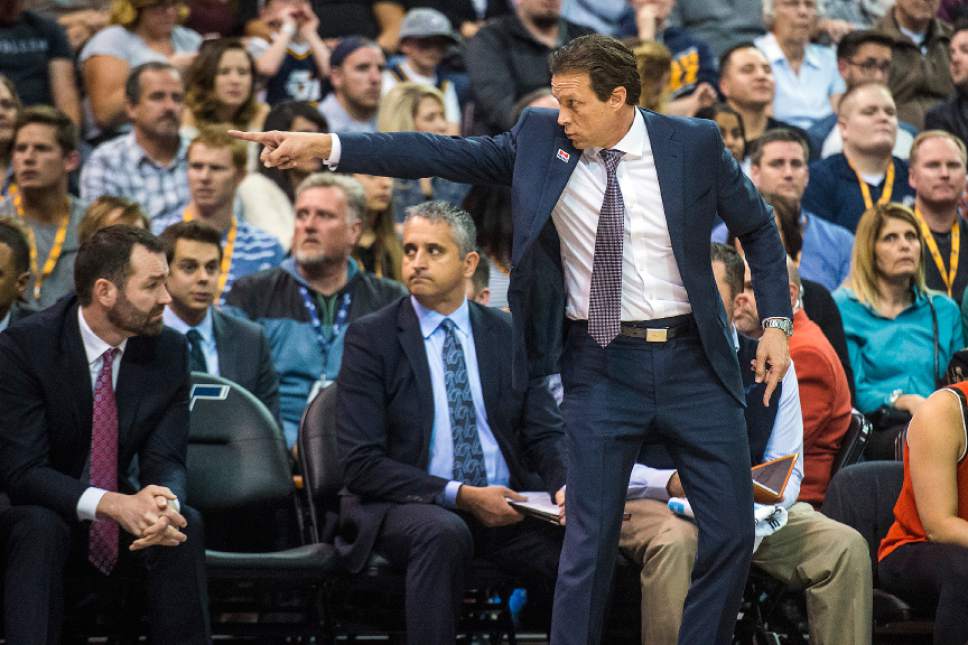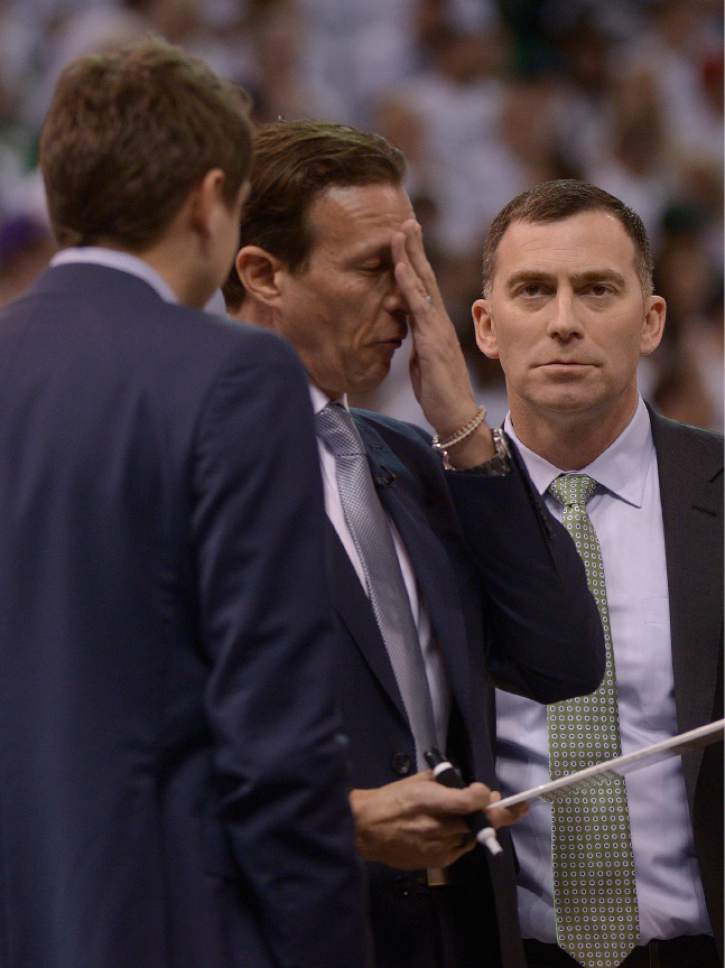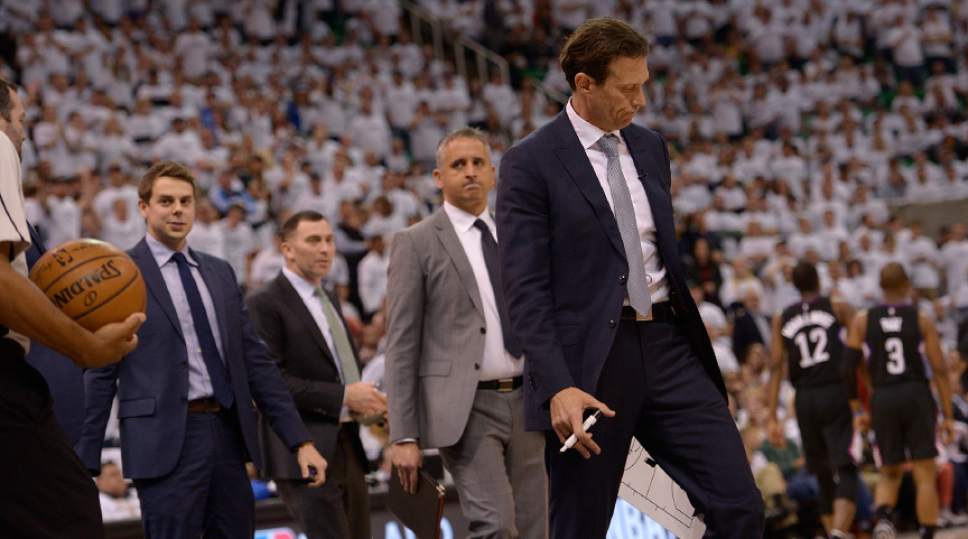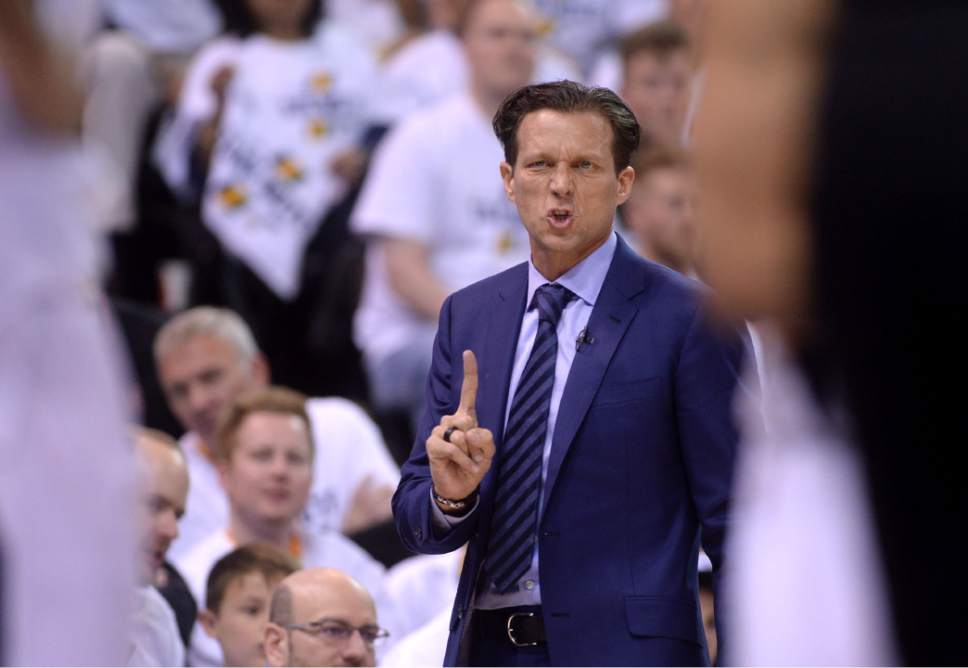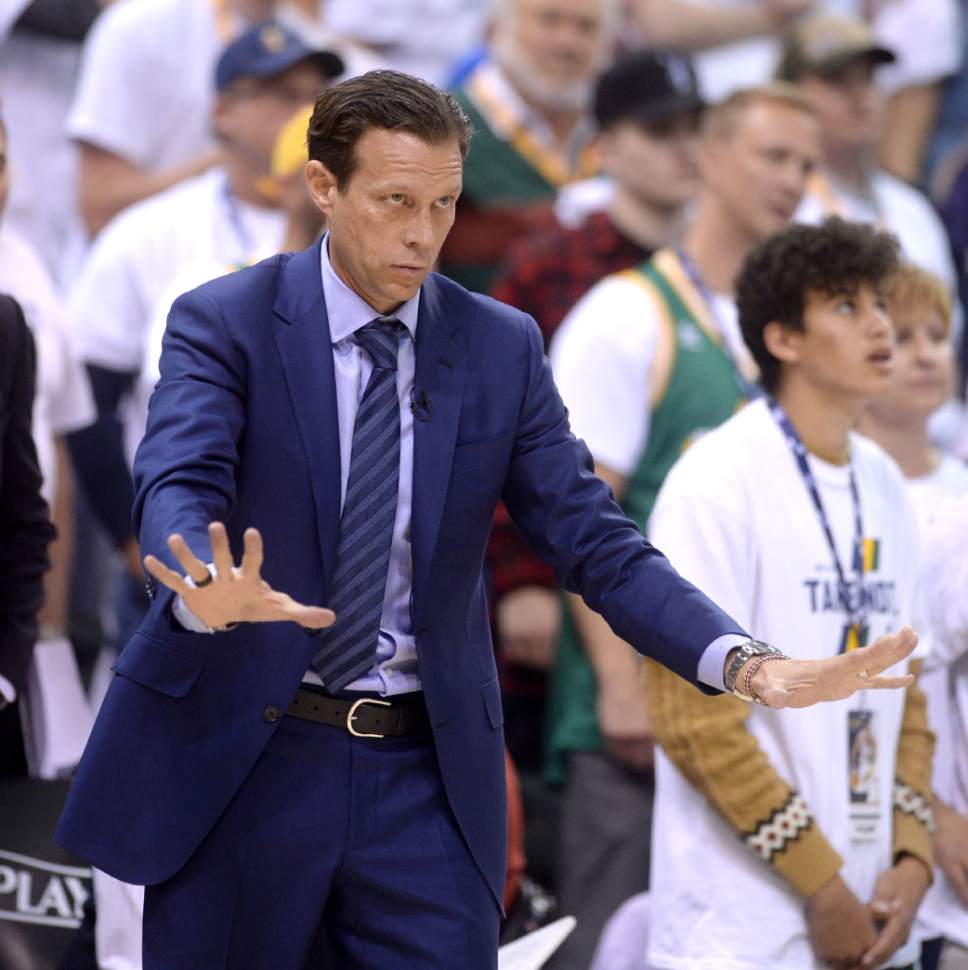This is an archived article that was published on sltrib.com in 2017, and information in the article may be outdated. It is provided only for personal research purposes and may not be reprinted.
Ryan Rosoff stepped out onto the boardwalk Sunday night at Rehoboth Beach, the resort town where he now lives in Delaware, wearing a Gordon Hayward jersey. Although he has no deep connection to Utah, Rosoff was psyched to see the Jazz beat the Clippers a few hours earlier. He's become a big Jazz fan for one primary reason: Quin Snyder.
Rosoff has known the Jazz coach for 40 years. He grew up directly across the street from him in a subdivision on Mercer Island, Wash., known as Dawn Villa. As he puts it, "If you rolled a basketball straight from the front of my house, you'd hit Quin's family's house."
That has significance because Rosoff actually had many basketballs roll across the street. There was a hoop in his driveway, as well as a hoop inside Snyder's garage. Back in the '80s, it seemed there was a basketball hoop in front of almost every house in that neighborhood. And Snyder knew where each of them was.
Mercer Island was — and is — an upscale area inside of Seattle, a stretch of land surrounded, as the name suggests, by water. "It's a place," Rosoff says, "of achievers, affluence and wealth."
And of sports, too.
Mercer Island High School became a national prep basketball powerhouse during those years, a school — led by You Know Who — that was ranked No. 1 team in the country, winning a state championship as a run-up to Snyder heading off to play at Duke. His father, Gary, was a vice principal at MIHS.
But we're getting ahead of the story here.
There were a dozen young athletes of varying ages who did the things kids do in sports back in the day in Dawn Villa — played pickup games, worked on their athletic skills, got in neighborhood competitions.
When he was about 12 years old, Snyder used to organize whiffle ball games in his front yard, games that Rosoff says had a strict outline of dos and don'ts.
"Quin had complete tournaments in his yard with typed-up rules," says Rosoff. "Where the bases were, what was fair, what was foul, the whole thing." Anyone who violated the rules would be unceremoniously kicked out of the games.
All the kids, including Quin's two brothers, Matt and Nate, played by Snyder's rules because he was the best athlete of the group, and everyone knew it.
Rosoff, who all these years later owns a Bay-area team-building company that hosts leadership and bonding events for employees from major corporations, says other kids naturally followed Snyder, even at those young ages, because he was pretty much the same then as he is now: "Smart, good looking, a great athlete, humble."
"Quin was just … different," he says.
A fistful of years younger than Snyder, Rosoff used to go over to Gary and Toni Snyder's hoop in their garage and shoot baskets at all hours of the day and night. "They never complained," he said. Snyder sometimes heard the pounding of the basketball and went out to teach Rosoff some of the game's basics.
"He and Jon Barry, who lived with Quin and Matt for a [short] time, used to come over and shoot at the basket in my front yard," Rosoff says.
A memory of Snyder that has lasted through the years for Rosoff occurred when two young kids — one bigger and older than the other — got in a fight at a neighborhood spot known as the "Spiderweb." The smaller boy, named Barry, often was bullied by classmates, and on this occasion, Barry was "getting his a— beat" by a kid named Jason. A group of about 30 kids circled around the fight. And then Snyder, who was a couple of years older, walked up on the main event.
"He saw what was going on, cleared all the kids out and pulled Jason off of Barry, picked Barry up and carried him home," Rosoff says. "He saved that kid. Yeah, he was a leader."
Snyder went on to become a McDonalds' All-American, won that state title, then played in three Final Fours at Duke, including the one played in Seattle in 1989. Duke practiced in Mercer Island High's gym during that visit.
Rosoff admits to being an unabashed Snyder fan, ever since Quin babysat him when he was 8 years old. "I remember him watching TV, eating, spinning a basketball on his finger," he says. "He could spin a ball for 45 minutes straight."
Four decades later, with his professional training, Rosoff recognizes now the same leadership qualities Snyder exhibited then in what he's doing with the Jazz.
"It's a lack of pretense," he says. "If people sense you're full of crap, they won't follow you. People see that Quin's a bright guy. When you're smart and successful, you can go one of two ways. You can become a pretentious D-bag or you can become a great influence on those around you. He deflects praise and takes criticism. He protects the [players] who work for him. They can see that he has their best interests at heart. Plus, he really is the smartest guy in the room."
The coach's law degree and MBA underscore the point.
Snyder is the last person who ever would classify himself as anybody's idea of an angelic kid. He was far from perfect, as a story in the local papers around Seattle revealed after a group of Mercer Island High School students, including Snyder, were suspended from school for two days when, as described in the Seattle Post-Intelligencer, "their senior prom partying got out of hand."
Tsk, tsk.
Jazz players probably would love to hear the details of that tale.
Either way, Rosoff echoes the thoughts of a lot of longtime and former residents of his native community when he says:
"Quin is a legend on Mercer Island. … It's a pleasure to see someone I knew to be a great guy, a great athlete succeed on a national scale and do it with grace, style and humility. But it doesn't surprise me or anyone who knew him. This is what everyone thought would happen with Quin. It's almost like he was pre-ordained."
GORDON MONSON hosts "The Big Show" with Spence Checketts weekdays from 3-7 p.m. on 97.5 FM and 1280 AM The Zone. Twitter: @GordonMonson.


